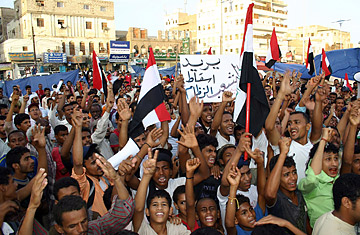
Anti-government protesters in Aden, Yemen, call for the ouster of Yemeni President Ali Abdullah Saleh, April 26, 2011.
(2 of 2)
For members of the Harak, South Yemen's independence isn't simply a matter of political disagreement but necessitated by what they deem to be irreconcilable cultural differences. Aden residents often refer to northern Yemenis as dahabashi, meaning savages. "We don't want the northern system of tribal patronage. We want the rule of law," says Qasim Dawoud, a longtime member of the Yemeni Socialist Party. "We were tricked into unity and now we are ready to reestablish our own state," he adds.
For one man, that war between the North and South has yet to come to an end. Brigadier General Ali Mohammed Assadi, an Aden native and a prominent southern movement leader, defected from the unified military and led his southern forces against the Saleh regime in the 1994 war. "The south was occupied by the British, then held by the iron fist of the Yemeni Socialist Party and since 1994, we have been living under the occupation of the northern tribal regime," says the general, speaking in his home in Aden, surrounded by friends and colleagues from Harak.
General Assadi's struggle against north Yemeni "colonialism" is a fight that has torn his life apart. In 2008, members of Yemen's National Security Bureau stormed his home and arrested him. "They broke down my door and opened fire, shooting at my children. I screamed for everyone to run before I was arrested and thrown into the political security prison in Sana'a. Members of Al-Qaeda are held in normal cells there but myself and other Harak members were locked in small boxes in the pitch black basement," he says.
He was imprisoned in his small cell for 13 months before he was inexplicably released. But he would gladly return to that darkness if it meant his son would still be alive. Just two weeks ago, the general and his son Giyab, a medical doctor and father of two, joined a funeral procession of another southern movement member who was killed by security forces. "Security forces opened fire on us with tank mounted heavy machine guns. My son was gunned down standing next to me. He's now one of the over 1,300 martyrs of the Harak," he trails off, staring blankly down into his newspaper.
Since the formal founding of Harak in 2007, there have been plans for a new government, though as yet no time table has been drawn up. The example of South Sudan, which is now on the cusp of independence from the regime in Khartoum, inspires many Harak members, who nevertheless point out thatthe new African nation was never a sovereign state in the past — a heritage and advantage South Yemen enjoys. "We have plans for a new government and a new political future," says General Assadi. "The new state will be a liberal, social democracy, similar to current European socialism." However, no formal military infrastructure is in place and defending their independence may prove to be difficult should Saleh — or a succeeding government in Sana'a — decide to retake the region. Still, most Harak members doubt Saleh's will and ability to do so. "We aren't worried about the response from the north. Our political and government infrastructure is already in place. All we have to do is pick up where we left off in 1990," says Assadi.
In Sana'a, tanks, light armored vehicles, and technical trucks with heavy machine guns mounted in the back can be found at most major intersections and, as night, soldiers with AK-47's check passing cars for weapons. However, in Aden, the regime has vanished. "Look around," says one local in the port city, "If we declare independence, who is going to stop us?" He then returns to sipping tea on the side of Mu'alla street, beneath the flag of south Yemen painted on the side of an apartment building.
